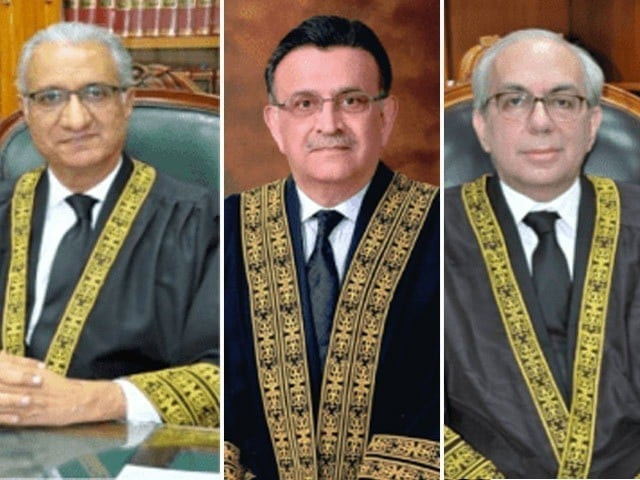SC upholds 90-day Punjab election rule
Dismisses ECP review; says constitutional mandate cannot be changed by any law

The Supreme Court upheld its prior verdict regarding elections in Punjab, affirming that they must occur within 90 days of the dissolution of the provincial assembly.
On Thursday, the apex court dismissed the review petition filed by the Election Commission of Pakistan (ECP). A special three-member bench, headed by Chief Justice Umar Ata Bandial and comprised of Justice Ijazul Ahsan and Justice Muneeb Akhtar, presided over the hearing.
During the session, ECP’s representative Sajeel Swati requested a week’s extension to present additional arguments. However, the court declined the request, maintaining that the focus should be on the review petition at hand.
Swati argued that a recent legal amendment empowered the ECP to set the election date. Justice Akhtar, however, reminded the lawyer that the current proceedings centered on the review petition, and new arguments not raised in the initial case should not be introduced.
Read ‘Law tweaks’ empower ECP to announce vote date
Justice Akhtar directed Swati to identify any errors in the court's previous ruling. Justice Ahsan underlined that the constitutional mandate of conducting elections within 90 days could not be overridden by legislation. He emphasised that the ECP could not exceed the 90-day deadline.
Swati acknowledged a timeframe for elections within 90 days, with provisions for exceptional cases. He highlighted certain inaccuracies in the court's interpretation of the ECP's objectives.
He cited the Constitution's stipulation for the ECP to ensure transparent elections. However, Justice Ahsan questioned if the ECP's failure to ensure transparency over five years would justify a postponement of elections. Swati clarified that this wasn't his argument.
Chief Justice Bandial reminded Swati that the ECP had initially conveyed that if security and funds were provided, they could hold the elections. The chief justice urged Swati to pinpoint errors in the judgment.
Swati contended that no law could limit the ECP's powers. He argued that the constitutional provision mandating elections within 90 days should be read in conjunction with Article 254, suggesting flexibility for exceptional circumstances.
Justice Ahsan challenged the ECP's role in deciding specific situations. Swati asserted that Article 218(3) empowered the ECP to make such decisions, not the court. Justice Ahsan questioned the source of the ECP's constitutional authority to delay elections.
Also read Pre-May 9 situation: Can the CJP rewind the clock?
Swati defended the ECP's broad authority in ensuring transparent elections. However, Justice Ahsan reiterated his query about the error in the court's decision.
Justice Akhtar stated that if the ECP encountered obstacles to conducting fair elections, it could approach the court, but it lacked the authority to unilaterally postpone elections. He emphasized that the court's ruling had provided a viable solution for the ECP to proceed with elections.
Chief Justice Bandial stressed that the Constitution did not permit any institution to violate its provisions. He pointed out the ECP's shifting stance: initially suggesting that elections could be held if security and funds were provided, but later claiming that polling was infeasible due to unforeseen reasons.
Swati cited the incident of May 9 as the reason for the impossibility of elections. Chief Justice Bandial acknowledged the ECP's perspective but expressed confusion about the ECP's understanding of the court's decision.
Subsequently, the court dismissed the ECP's review petition after concluding the hearing.



















COMMENTS
Comments are moderated and generally will be posted if they are on-topic and not abusive.
For more information, please see our Comments FAQ